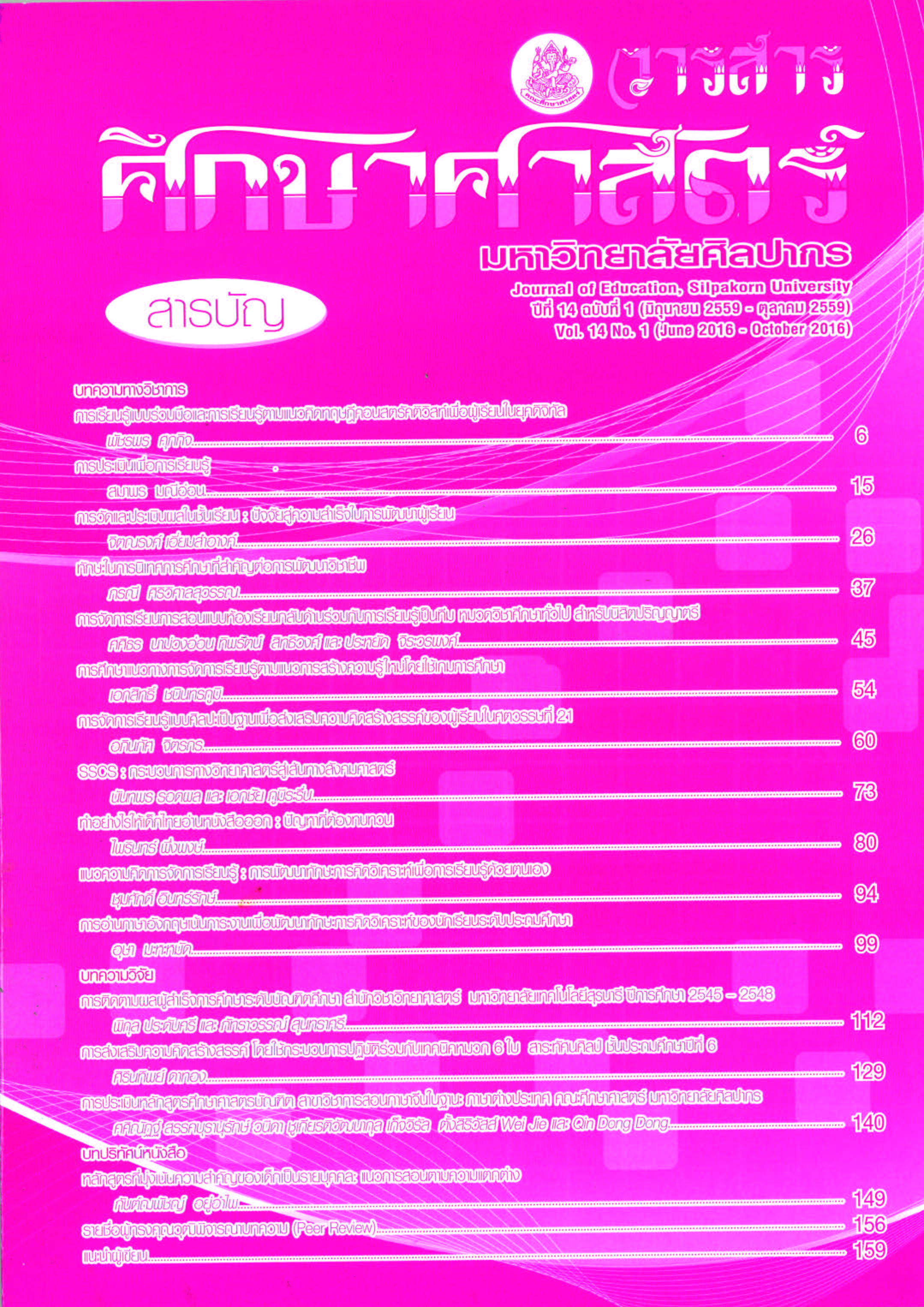การประเมินเพื่อการเรียนรู้
Main Article Content
Abstract
การประเมินเพื่อการเรียนรู้ ต้องทำอย่างจริงจัง ค่อย ๆ เปลี่ยนวิธีคิดของครูและผู้มีส่วนเกี่ยวข้องการสอนและการประเมินต้องมีการวางแผนให้ไปด้วยกัน ต้องพยายามทำความเข้าใจและสร้างความตระหนักให้ครูเห็นว่า ถ้าเปลี่ยนแปลงวิธีประเมินจะทำให้การเรียนรู้ดีขึ้น ให้ครูเข้าใจว่าการประเมินคือการพัฒนาการเรียนรู้ของนักเรียน ไม่ใช่การจัดอันดับ การประเมินจึงเป็นทุกอย่างตั้งแต่การปรับปรุงพัฒนาเพื่อการเรียนรู้เป็นเทคนิคการสอน หรือเป็นเครื่องมือในการเรียนรู้ ที่ผ่านมา การประเมินระหว่างเรียน (Formative Assessment) ของครูส่วนใหญ่มุ่งที่การเก็บคะแนน ครูและนักเรียนขาดความรู้ความเข้าใจเรื่องการวัดและประเมินผล ถ้าครูมีความรู้ความสามารถในการวัดผล ทั้งการประเมินระหว่างเรียน (Formative Assessment) และการประเมินผลสัมฤทธิ์ทางการเรียน (Summative Assessment) ก็จะเป็นปัจจัยที่มีผลโดยตรงต่อคุณภาพการเรียนรู้ของนักเรียน และในงานวิจัย OECD (2006) พบว่า การประเมินเพื่อการเรียนรู้ และการประเมินความก้าวหน้าในการเรียนรู้มีผลต่อผลสัมฤทธิ์ทางการเรียนของนักเรียนอย่างแท้จริง
Assessment for Learning
Assessment was dynamic and natural for learning process in the classroom and should be coincided with measurement. Although there was a variety of tools and strategies of assessment, teachers did not need to use all of them depending on learning objectives, activities, learners’ behaviors and actual learning situations. Teachers had to concern on authentic assessment with reasonable and appropriate selection. The problem was found that learners’ questioning in the classroom was lacked, teachers could solve it by grouping, brainstorming curious questions and writing to teachers through teamwork. Teachers could also encourage learners to question by asking learners about what they did not know. Questioning was progressive inquiry strategies. In the case in Finland, questioning skills were applied into science instruction with different ways according to science problems. Teamwork would help learners to communicate each other in groups and improve thinking skills. Self-assessment and peer-assessment should be designed for practicing learners to improve questioning skills.
Assessment for learning need to do seriously and change teachers and stakeholders perspectives. While instruction and assessment need to plan correspondingly. In addition, understanding and awareness of assessment for learning should be classified whether changing assessment methods would improve learning process. Encouraging teachers to be clear that assessment is learners’ learning progress not being the ranking. Therefore, assessment would be overall in learning process: developing for learning, being teaching techniques, or being tools for learning. In the recent years, typical formative assessment was emphasized on scoring, teachers and learners lacked of clear understanding on assessment. If teachers were knowledgeable on both formative and summative assessment, it would impact directly to quality of learning and research from OECD (2006) stated that assessment for learning and progressive assessment for learning influenced learners’ achievement.


